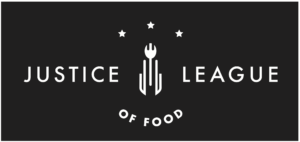Investing in job training programs and providing community meals in Des Moines
The Justice League of Food (JLF) in Des Moines, Iowa believes they can help break the cycle of poverty through an investment in individuals and the creation of jobs. The organization hopes to reduce homelessness and hunger in central Iowa by providing skills training, apprenticeships, and job placement services in the food and beverage industry for at-risk populations, including those in foster care and the homeless. JLF also delivers meals in two community locations, three days a week.

Providing food and supplies to aid the community in response to COVID-19
In 2020, the COVID-19 pandemic resulted in many JLF apprentices being furloughed from their positions in food services due to business closures. The record unemployment caused by the pandemic also created an increase in food insecurity, leading to an increased demand for JLF’s community meals program.
In response, the JLF received funding from Microsoft’s COVID-19 Response Fund to support the preparation and delivery of meals to those in need. The funds from Microsoft are being used to purchase food, personal protective equipment, and to-go containers to support JLF’s growing community meals program that’s operated in partnership with Hunger Free Polk County. Due to the loss of jobs from COVID-19, JLF is delivering more meals than usual—currently 2,100 people receive meals every month. In fact (and unfortunately), the community meals program grew 35 percent during the first 30 days of lockdown. “Our measure of success with this program is not being necessary anymore,” said Nick Kuhn, JLF President and Director.
JLF purchases the food while the Microsoft COVID-19 Response Funding ensures the community meals program can continue in this time of additional need. The funds also enabled JLF to re-engage with student workers who were furloughed from JLF’s apprenticeship programs due to COVID-19 less than a year after the training kitchen opened. “The grant from Microsoft really allowed us to not only expand the program and afford to sustain the program and grow it, but it also afforded us the ability to bring back some of our students in a part-time capacity to help out,” said Kuhn.
This re-engagement with students provided a much-needed connection point and additional job training opportunities. “If you think about the folks that we deal with, they’re the most vulnerable segment of our society, both financially and emotionally, so we were just trying to stay in touch with our kids,” said Kuhn. “It was really an exercise in staying in touch and painting a picture of hope. The ability to bring them back, even one day a week, was a huge thing for those kids that we deal with. It showed them that the world is not coming to an end and that there’s still a future for them. We attribute much of that to Microsoft; that was a very generous grant at a time that we had no ability to generate revenue to support ourselves.”
Transforming offerings based on changing community needs
The JLF has quickly shifted its programming to create the biggest impact given current community needs caused by COVID-19. As Kuhn explains, “The advantage we had over a lot of businesses was the technology.” The pre-existing JLF smart phone app was originally used to sell food commercially that was prepared by JLF students. Modifying the existing app, the group was able to provide online grocery shopping (including offering hard-to-get items, like toilet paper and beef) and easy, distanced pickup.
JLF also modified the way it operated its community meals program to ensure continuous availability when there was the most need. “Pre-COVID, the way it worked was these families in need would show up at a community center and sit down to have dinner. When COVID-19 hit, they weren’t allowing anybody in the building, so all of a sudden, we were asked to provide to-go containers. That stuff adds up quickly when you’re feeding that number of people,” said Kuhn. The Microsoft donation helped to cover the additional and unanticipated expense of these containers. “As the occasional delivery person, [the need] became really tangible when I would show up two to three hours before dinner time, and there’s already a line of cars. They need this food so much, and they’re getting in line early in the day,” explains Lynn Kuhn, JLF Vice President, Secretary, and Director.
Looking to the future as needs continue to evolve
As restaurants and the food service industry begin to reopen, JLF’s culinary training program is ramping back up. Students initially came back one day a week, then half-time, and more recently, are working three-quarter time. These participants get paid a living wage, learn important skills, and after completing the two-year program, are connected with high-quality employers in food service.
“Staying in touch with them was so important [during the shutdown], and it was a challenge, because they weren’t very responsive at times. It was inconsistent. So to be able to bring them back into the space and see their faces, I just can’t stress to you what a big deal that was, because keeping them engaged was everything. We could’ve very easily lost them forever,” said Lynn. “The Microsoft grant kept us alive.”
“If you think about the folks that we deal with, they’re the most vulnerable segment of our society, both financially and emotionally, so we were just trying to stay in touch with our kids.”Nick Kuhn, JLF President and Director

